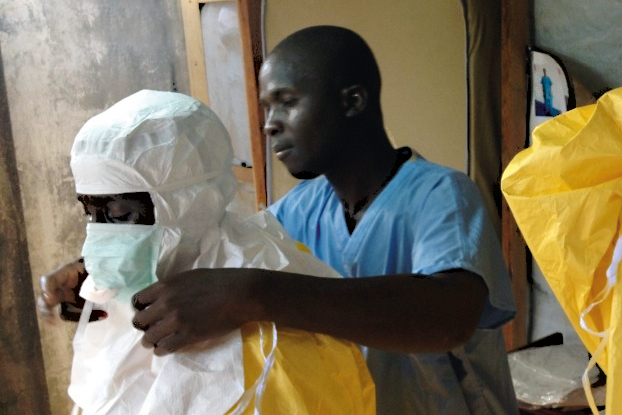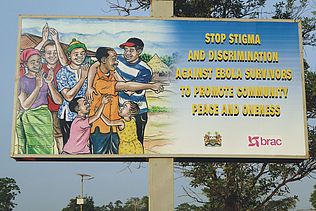Since summer 2014 the Ebola virus has had the Mano River Region firmly in its grip. The health systems of Liberia, Guinea and Sierra Leone, which make up this tri-state area, are among the weakest in the world. With a confirmed 25,050 victims and 10,340 deaths (status: 1 March 2015), the epidemic is bigger than all previous outbreaks of the virus. The causes of this disaster are inseparably connected with social, economic and political conditions.
National and international policies over decades have neglected the fundamental needs of the population, creating ideal conditions for the rapid spread of the deadly virus. Mining concessions for West Africa's mineral resources are granted to international companies on favourable conditions, without contractually obliging the companies to reinvest, while the health and educational systems falling apart. In regions rich in natural resources, people are displaced and dispossessed on a massive scale. Poverty-driven migrations and logging of forest areas have also contributed to the situation where people are living in increasingly close proximity to the wild animals who are the vectors of the Ebola virus.
Mistrust of the state and state authorities
Another factor in the rapid spread of the virus was the reinforcement of the population’s all-too-often justified mistrust of the state and state authorities as a result of the authoritarian approach to fighting the epidemic. In many places, entire districts were sealed off without ensuring adequate supplies to the quarantained people. Instead of public education, coercive measures were often ordered and implemented. Protective measures were met with resistance and not followed. All this shows how important trust is for fighting epidemics effectively – the sort of trust that the medico partner Network Movement for Justice and Development has won through its years of work at the side of the powerless.
During the civil war NMJD’s members were already fighting for equity in the use of the country’s mineral resources and calling for expansion of local health centres. This meant that the many NMJD employees and activists were able to work successfully on limiting the expansion of the epidemic –training and coordinating volunteer health workers, who went from door to door to educate people, preparing educational radio broadcasts and establishing advisory centres. This mobilisation of local structures was a decisive contribution to solve conflicts, reduce fears and accept preventive measures.
NMJD is also committed to the struggle against stigmatisation of survivors who have been excluded by their own families as a result of fear and lack of knowledge. The activists explain to people that there is no further risk of infection from their relatives, and they’ve shown this by demonstratively hugging survivors at local meetings. A small gesture – a big effect!
By the end of 2014 the epidemic in Sierra Leone was contained but not defeated. However, hardly nothing has changed with regard to its causes, which makes it all the more important to go beyond simply mitigating the suffering. What matters instead is to fight for global redistribution mechanisms that deliver health care which is accessible to all and make possible a life of dignity.


